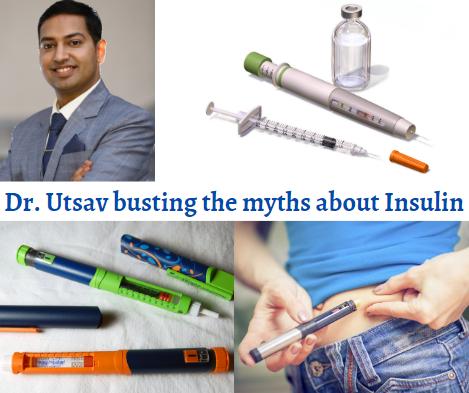
Insulin: Myths and Facts
We come across many patients reluctant to start Insulin when prescribed by their doctor. They bear many misconceptions, apprehensions and uncertainties regarding Insulin. This is an initiative, to clear doubts, spread awareness and mitigate fear of Insulin, improving its acceptance in the general public. Here are some common myths and facts about Insulin.
Myth: Insulin is harmful for human body
Fact: Insulin is a hormone naturally produced in your body which lowers blood glucose. Type 1 diabetics are not able to synthesize insulin so they need to take it lifelong. In fact, insulin is the best way to lower your blood glucose.
Myth: Insulin is habit forming
Fact: Insulin is not a drug you can get addicted to! People already have insulin in their blood from birth. In fact, insulin is the best treatment option during acute illness or surgery, pregnancy, glucose toxicity or failure to achieve goals with oral anti-diabetic medications. Recent studies have shown that starting insulin early in the course of your treatment can help reverse your diabetes.
Myth: Insulin injections are painful
Fact: Although no one likes a needle prick, most people are surprised by how little an insulin injection hurts. Insulin does not “sting” going in, and the needles are very small and thin. Most people find that it is less painful than a finger stick to monitor their blood glucose level.
Myth: Insulin is the last stage treatment
Fact: Many people believe insulin is only for people with advanced, serious diabetes. However, insulin is often pushed to a later stage only because of patients' reluctance. Considering the benefits of insulin in delaying many diabetes-related complications, doctors now prescribe it to people at an earlier stage of diagnosis, rather than waiting until its absolutely necessary.
Myth: Insulin means I failed in my diabetes treatment
Fact: Diabetes is a progressive disease; eventually your pancreas is just not able to keep up with your body's need for insulin—no matter what you've done to manage your diabetes. When other medicines no longer keep your blood glucose on target, insulin is often the next logical step for treating diabetes.
Myth: Using Insulin during pregnancy will harm the baby
Fact: Insulin is the safest treatment option for diabetes during pregnancy as it does not crosses the placenta, while other anti-diabetic medications do. Consistent high blood glucose levels are much more likely to complicate a pregnancy and affect the health of the mother and the baby.
Myth: Insulin cause hypoglycemia
Fact: It’s true that insulin can cause low blood glucose. However, with the newer or long-acting insulin, hypoglycemia is less likely to occur. When taken in the correct prescribed dose, risk of hypoglycemia is very rare.
Myth: Insulin can cause blindness, kidney failure or even death
Fact: These complications are associated with diabetes itself, not insulin. On the contrary, starting insulin at an early stage of diabetes can help delay or prevent these complications.
Myth: Insulin is too expensive
Fact: Diabetes is an expensive affair, no question about it. Generally, however, insulin is usually less expensive than using several different types of oral medications or facing complications arising from uncontrolled diabetes.
Myth: Insulin will make my life complicated and my life will change
Fact: Many people believe that once they start insulin, they can no longer be independent, live alone, travel, or eat away from home. It's actually the opposite; insulin puts you in a better state to manage your condition. Compact insulin devices are convenient to carry — even when you're travelling.
Actually, many people find that their lives do change with insulin—for the better. They have more energy, have more flexibility in their schedule, and feel more positive about themselves. After starting insulin, many people wonder why they waited so long to feel better.
SAY YES TO INSULIN, CHANGE THE WAY TO MANAGE YOUR DIABETES
Dr. Utsav Sahu, MBBS (Gold Medalist), MD (Internal Medicine), PGD in Clinical Endocrinology & Diabetes (RCP, London)
Be the first to add your comment
.jpg)





_(1).png)

